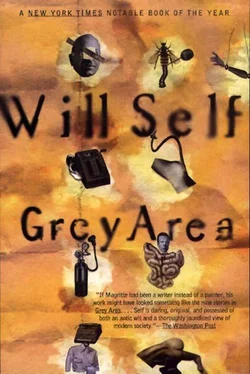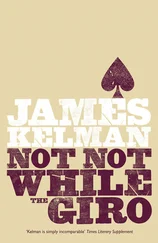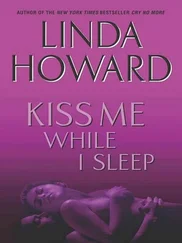‘Thanks very much, old fellow. No, no, I know what killed the thing so it’s of no interest to medical science. I used to be a dab hand with the scalpel, so I’ll cut the tumours out and the lady wife and I can have this one for Sunday lunch. Now, do get inside, Simon-Arthur, I don’t want to see you at surgery this afternoon.’ They bade farewell, and the doctor vanished into the sickly yellow of the boiling fog bank.
* * *
The Doctor didn’t see Simon-Arthur at his emergency surgery that afternoon, because against Jean-Drusilla and Christabel-Sharon’s pleading, he decided to take a walk.
Simon-Arthur had been trying to work in his studio all morning, but the terrible vision from the previous night kept haunting him. He fancied he could still hear every faltering breath and choking cough of the Brown House’s inhabitants. And when in the mid-morning he took a break and went down to inhale some steam with Friar’s Balsam, the sight of the children sitting in a silent row on one of the sofas in the drawing room, while the maid passed the nebuliser mask from one to the next, brought tears to his eyes.
When they were all seated at the dining-room table, eating off the second-best china because it was a Saturday, Simon-Arthur addressed the table at large, saying, ‘I think I’ll go out after lunch, just for a breath’ — he bit back the figure of speech — ‘for a walk.’
‘I really feel you oughtn’t, Simon-Arthur;’ said his wife. ‘You were out for far too long this morning, and without a mask. You know what Anthony-Anthony says, even with a chemical mask you shouldn’t really be out for more than half an hour at a time.’
‘It’s just that I feel terribly claustrophobic in the house today. I haven’t had a walk for almost a month now. I’ll go up to the golf course and then I’ll come straight back. I’ll be fine. I didn’t even have too much of a turn after going out this morning.’
‘Please don’t, Simon-Arthur,’ said Christabel-Sharon. Her freckle, spattered features were tight with concern. ‘You know the Patriarch is coming to say a special mass tomorrow. You won’t want to miss that. And if you go out for a walk you’ll have been out for forty minutes — and you shan’t be able to go and get the medicated incense for his censors in Risborough.’
‘Please, everyone, don’t worry!’ Simon-Arthur said this a little louder than he intended to. But he hated having it drawn to his attention just how dependent all of them were on him, right down to the very practice of their religion. ‘I’m going out for a walk and that-is-that.’
Simon-Arthur went up the farm track, through the farm and past the manor house where Peter-Donald and his family lived. The fog had lifted ever so slightly and he could see the crenellated chimneys of the house. He wondered whether Peter-Donald had managed to get a good bag, or at any rate a non-cancerous one.
It was uncomfortable walking. The mask he wore was a cheap model. Really only a plastic mouth- and nose-piece, containing a thick wad of cotton wool soaked with Ventalin. The straps chafed the back of his head, and the smell of the chemicals when he inhaled was almost worse than the fog itself.
Simon-Arthur reached the road on the far side of the estate and crossed it. The ground here was completely devoid of grass cover. The land had been bought up by a Japanese syndicate about a year before the fog descended. It was less expensive, then, for Japanese golfers to fly to England to play than to join a club in their own country. The syndicate had landscaped the course, but when the fog came they abandoned the whole project. Now the prospect of bare mud, formed into useless fairways, bunkers and greens that were really browns, looked wholly unearthly and anti-natural, like some section of an alien planet, poorly terraformed.
As he walked, Simon-Arthur dwelt once again — as he had so many times before — on the crippling irony of his bringing his family to live in the country. He had done it because Henry had bad asthma — as he did himself. Their doctor in London was certain that it was pollution-related. About four months after they had taken up residence in the Brown House the fog moved in with them.
‘Oh Christ! Oh God, oh Jesus. Please come! Please help us. We are but clay, but dust. .’ Simon-Arthur muttered this through his mask; and then, not quite knowing why, but feeling that if he wanted to pray aloud it was unseemly to do it with this ugly mask on, he took it off.
To his surprise the fog didn’t taste that bad, or catch in his throat. He took a few shallow, experimental breaths to check that he wasn’t mistaken. He wasn’t: the fog no longer oozed soupily into his constricted chest. He took some deeper breaths, and with a further shock felt his eustachian tubes clear — audibly popping as they did so — for the first time in years. Now he could hear cars moving along the road behind him with great clarity. He took a few more, deeper breaths. It was amazing, the fog must be clearing, he thought; the miasma must be departing from our lives!
Then he started to take in great gouts of air, savouring the cleanness of its taste. ‘At last, at last!’ he shouted out, and heard his voice reverberate the way it should do, not fall flat. ‘Thank you, thank you, thank you, thank you, thank you, thankyou, thangyou, thangyu,’ he garbled. The fog was lifting, there was a bright light up ahead of him, beyond the fourth green of the half-constructed course. Simon-Arthur strode towards it, his legs feeling light and springy. He was an intensely religious man, and he crossed himself as he staggered forward; crossed himself and counted out a decade on the rosary in his pocket. He was prepared for Redemption.
They didn’t find the icon painter’s body until the following day. Jean-Drusilla had alerted the authorities after Simon-Arthur had been gone for forty minutes, but by then it was already getting dark and the fog was too thick for a search party, even with high-powered lights. As for radar, that too was useless, for there was a particularly high magnesium content building up in that evening’s opacity.
By chance Peter-Donald and Anthony-Anthony were in the party that found him. He was spread out, smeared even, on the muddy surface, in much the same posture that the cancerous pheasant had expired on the day before. Like the pheasant, a pool of blood and mucus had flowed out from his mouth and stained the ground. And, as before, the doctor knelt down and examined the white flecks in the stain.
‘Poor bugger,’ he said, ‘how strange, he had cancer as well. Never thought to give him an X-ray, because I felt certain that his asthma was going to get him first. He wasn’t well at all, you know.’
Peter-Donald was taking his ease on a shooting stick he’d pressed into the mud. ‘Well, at least the fellow had the decency not to die on the green, eh?’ It wasn’t that he was being disrespectful to Simon-Arthur’s memory, it was only that the times bred a certain coarseness of manner in some — just as they engendered extreme sensitivity in others.
‘Yes, well, he must have had the haemorrhage on the green, and then rolled into this bunker and died.’
‘Tidy, what?’
‘You could put it that way.’ The doctor stood up and indicated to the stretcher bearers who were with them that they should remove the body. ‘The peculiar thing is that he and I saw a pheasant die in just this fashion yesterday.’
‘What, of cancer?’
‘Absolutely.’
‘Well, y’know, Anthony-Anthony, I can’t say I’m surprised in Simon-Arthur’s case. Not only was the fellow asthmatic, but I used to see him all over the shop without a scuba on. Bloody silly — foolhardy even.’
Without bothering further with the corpse, the two men turned and headed off back towards the manor. They were looking forward to a glass of linctus before lunch. Both of them had chronic bronchitis — and neither was as young as he used to be. For a while their conversation could be heard through the clouds of noxious dankness:
Читать дальше












